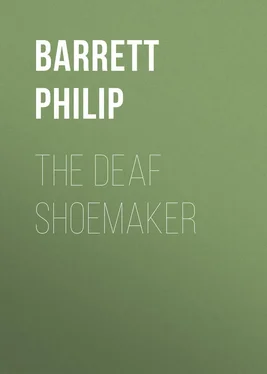Philip Barrett - The Deaf Shoemaker
Здесь есть возможность читать онлайн «Philip Barrett - The Deaf Shoemaker» — ознакомительный отрывок электронной книги совершенно бесплатно, а после прочтения отрывка купить полную версию. В некоторых случаях можно слушать аудио, скачать через торрент в формате fb2 и присутствует краткое содержание. Жанр: foreign_antique, foreign_prose, на английском языке. Описание произведения, (предисловие) а так же отзывы посетителей доступны на портале библиотеки ЛибКат.
- Название:The Deaf Shoemaker
- Автор:
- Жанр:
- Год:неизвестен
- ISBN:нет данных
- Рейтинг книги:3 / 5. Голосов: 1
-
Избранное:Добавить в избранное
- Отзывы:
-
Ваша оценка:
- 60
- 1
- 2
- 3
- 4
- 5
The Deaf Shoemaker: краткое содержание, описание и аннотация
Предлагаем к чтению аннотацию, описание, краткое содержание или предисловие (зависит от того, что написал сам автор книги «The Deaf Shoemaker»). Если вы не нашли необходимую информацию о книге — напишите в комментариях, мы постараемся отыскать её.
The Deaf Shoemaker — читать онлайн ознакомительный отрывок
Ниже представлен текст книги, разбитый по страницам. Система сохранения места последней прочитанной страницы, позволяет с удобством читать онлайн бесплатно книгу «The Deaf Shoemaker», без необходимости каждый раз заново искать на чём Вы остановились. Поставьте закладку, и сможете в любой момент перейти на страницу, на которой закончили чтение.
Интервал:
Закладка:
Philip Barrett
The Deaf Shoemaker / To Which Are Added Other Stories for the Young
My Dear Young Friends:
Encouraged by your kind reception of my former little volume, I have gathered together my scattered sketches with the earnest wish and heart-felt prayer that they may be instrumental in leading you to childhood’s best and truest friend – the blessed Saviour.
Your attached Friend, PHILIP BARRETT,Rural Retirement, Va.
JOHN McDONOUGH
“Jesus, lover of my soul,
Let me to Thy bosom fly,
While the raging billows roll,
While the tempest still is high.
“Hide me, O my Saviour, hide,
Till the storm of life is past
Safe into the haven guide;
O receive my soul at last.”
“John McDonough! who is he? ” my young reader will doubtless exclaim.
It is true, his name is not written in golden letters on the pages of History, – no Senate chamber has resounded with his eloquence, – the conqueror’s wreath has never encircled his brow; but John McDonough has performed a deed which posterity, to the remotest generation, can never forget.
But a few weeks since, the steamer Northern Indiana was burned on one of the Northern lakes, and then and there it was, that this noble and gallant deed was performed.
You who have never seen a ship on fire can form no idea of the awful horror of such a scene. All was wild excitement and mad confusion. The flames spread like a whirlwind over the noble ship, and soon wrapt it in their withering embrace. Every heart was lifted to God in prayer; every voice was joined in supplication; mothers were clasping their infants to their bosoms; husbands endeavoring to save their wives; fathers encircling their sons in their strong and unfailing arms; the waters were a mass of living, immortal beings, struggling for life.
Amid the hissing of the flames, the pale glare of the atmosphere, and the wild shrieks of hopeless agony that arose from the sinking passengers, John McDonough might have been seen, calm and composed, struggling nobly with the swelling waves, and bearing in one hand life-preservers to the perishing souls scattered over the surface of the lake, which, to many, was destined soon to be the winding-sheet of Death.
How noble the action! How my heart swells within me when I think of the gallant and fearless conduct of such a man!
When despair clothed every brow, fear paled every cheek, and the wild cry – “Save, Lord, or I perish” – echoed in the ears of the drowning, his lofty brow showed no signs of fear, his eye beamed with hope. He still struggled on, and on, till many and many a soul was rescued from a watery grave.
I had rather be the brave, the dauntless, the self-sacrificing John McDonough – the humble laborer on the ill-fated Northern Indiana – than Alexander the Great weeping because there were no other worlds for him to conquer.
God bless thee, noble John McDonough!
Though no eulogy be pronounced at thy death, no booming cannon thunder over thy grave, no proud monument mark thy resting-place, yet there will be erected in the hearts of thy countrymen a monument more lasting than marble, more enduring than brass. May thy name live forever!
My young friends, do you not also see, concealed as it were by the terrible grandeur and painful horror of the scene, a beautiful and important truth displayed in the conduct of this noble-hearted man?
We are all embarked in a ship. The destination of that ship is Eternity . The voyage is tempestuous, and when we least expect it, the fires of hell may take hold upon us. But, thanks be to God, there is a Great Life-preserver always at hand. That Life-preserver I now extend to you: reject it if you dare; destruction is the consequence. Accept it; and you will soon be landed on the blissful shores of Heaven. That Life-preserver is
“Rock of Ages, cleft for me,
Let me hide myself in Thee;
Let the water and the blood,
From Thy wounded side which flowed,
Be of sin the double cure;
Cleanse me from its guilt and power.
“Not the labor of my hands
Can fulfil the law’s demands;
Could my zeal no respite know,
Could my tears forever flow,
All for sin could not atone,
Thou must save, and Thou alone.
“Nothing in my hand I bring,
Simply to Thy cross I cling;
Naked, come to Thee for dress;
Helpless, look to Thee for grace;
Vile, I to the Fountain fly,
Wash me, Saviour, or I die.
“While I draw this fleeting breath,
When my heart-strings break in death,
When I soar to worlds unknown,
See Thee on Thy judgment throne, —
Rock of Ages, cleft for me,
Let me hide myself in Thee.”
MARY AND HER DRAWER;
OR, NOTHING MADE BY GETTING ANGRY.
I cannot curb my temper,
I might as well have tried
To stop, with little pebbles,
A river’s rapid tide.
My good resolves I hardly form,
When trifles raise an angry storm.
The church bells were sending forth their merry chimes, and hundreds of children were wending their way to the Sabbath-school. Mary was late that morning, and ran very quickly to her drawer, in which were kept her gloves, hymn-book, catechism, &c., and endeavored to jerk it open at once; but in so doing she got it crooked, and it would move neither way.
Being in a great hurry, she began at once to fret and blame the drawer for not coming out. She soon became quite angry; her check flushed, her eyes sparkled, and with a violent effort she pulled the drawer out, emptied its contents on the floor, tore her dress, disfigured her hymn-book, and almost ruined the drawer itself.
Her father was patiently waiting in the hall for his little daughter, when the accident occurred, and asked her what was the matter. Her instant reply was, “Nothing, Father; you go on – I will overtake you presently.”
Little Mary did not overtake her father, and he looked in vain for her at the Sabbath-school.
Her dress was so badly torn that she could not go to Sabbath-school, and with tears flowing down her cheeks, she sat down and thought soberly over her conduct.
She doubtless felt very sorry for her anger, and the unnecessary damage she had done.
No one, when the family returned from church, said a word to her, but left her to her own reflections. When her father had taken off his hat and seated himself, she modestly approached him, threw her arms around his neck, and said, —
“Father, do you know why your little Mary was absent from Sabbath-school this morning?”
“No, my child,” he replied.
“I was in a very great hurry, and attempted to pull my drawer out very quickly, and got it fastened so tightly that it would move neither one way nor the other. I tried and tried, but it would not move. I then got angry with the drawer, pulled it very hard, and not only scattered its contents over the floor, but hung the knob in my dress and tore it so badly that I could not come to the Sabbath-school.”
Her father told her he willingly forgave her, and that she must also ask God’s forgiveness, for she had committed a sin in giving way to her anger. He also told her to remember that nothing was ever made by getting angry. If she ever tried to do anything, and could not do it at once, she must not get angry, but be patient and calm.
I hope this little thing taught Mary an important lesson – and may it teach you the same, dear little reader. Nothing was ever made by getting angry, but something always lost.
Читать дальшеИнтервал:
Закладка:
Похожие книги на «The Deaf Shoemaker»
Представляем Вашему вниманию похожие книги на «The Deaf Shoemaker» списком для выбора. Мы отобрали схожую по названию и смыслу литературу в надежде предоставить читателям больше вариантов отыскать новые, интересные, ещё непрочитанные произведения.
Обсуждение, отзывы о книге «The Deaf Shoemaker» и просто собственные мнения читателей. Оставьте ваши комментарии, напишите, что Вы думаете о произведении, его смысле или главных героях. Укажите что конкретно понравилось, а что нет, и почему Вы так считаете.











